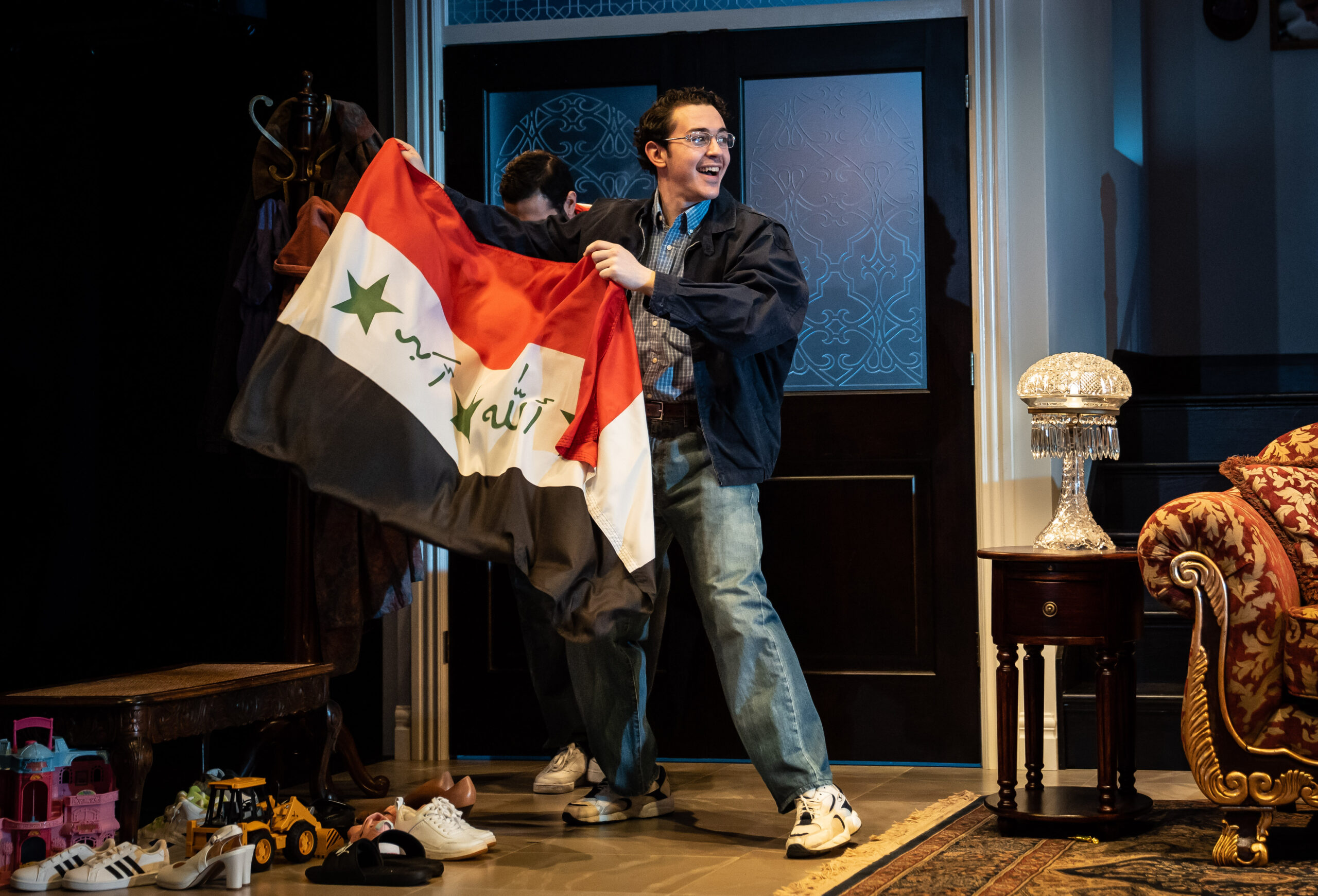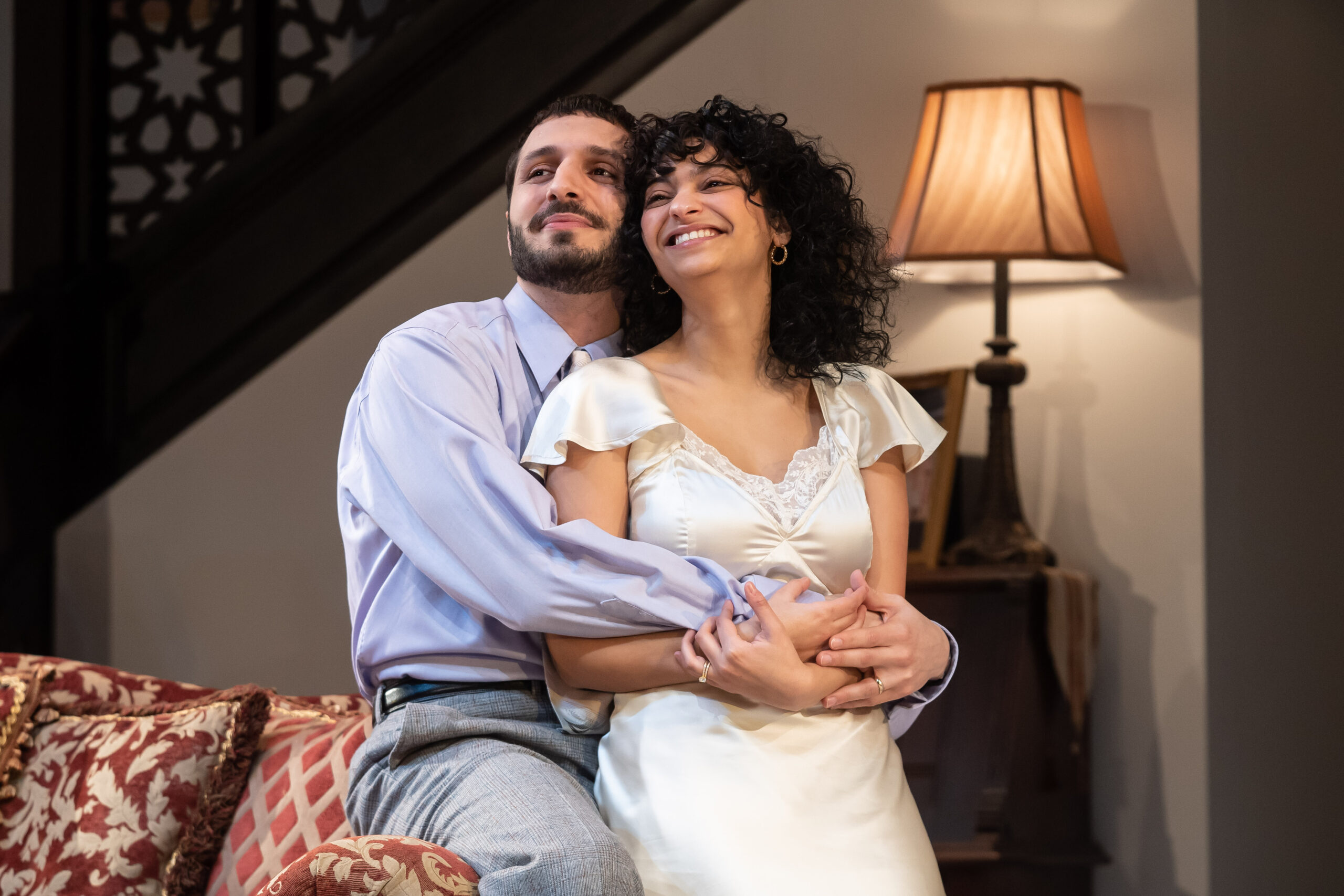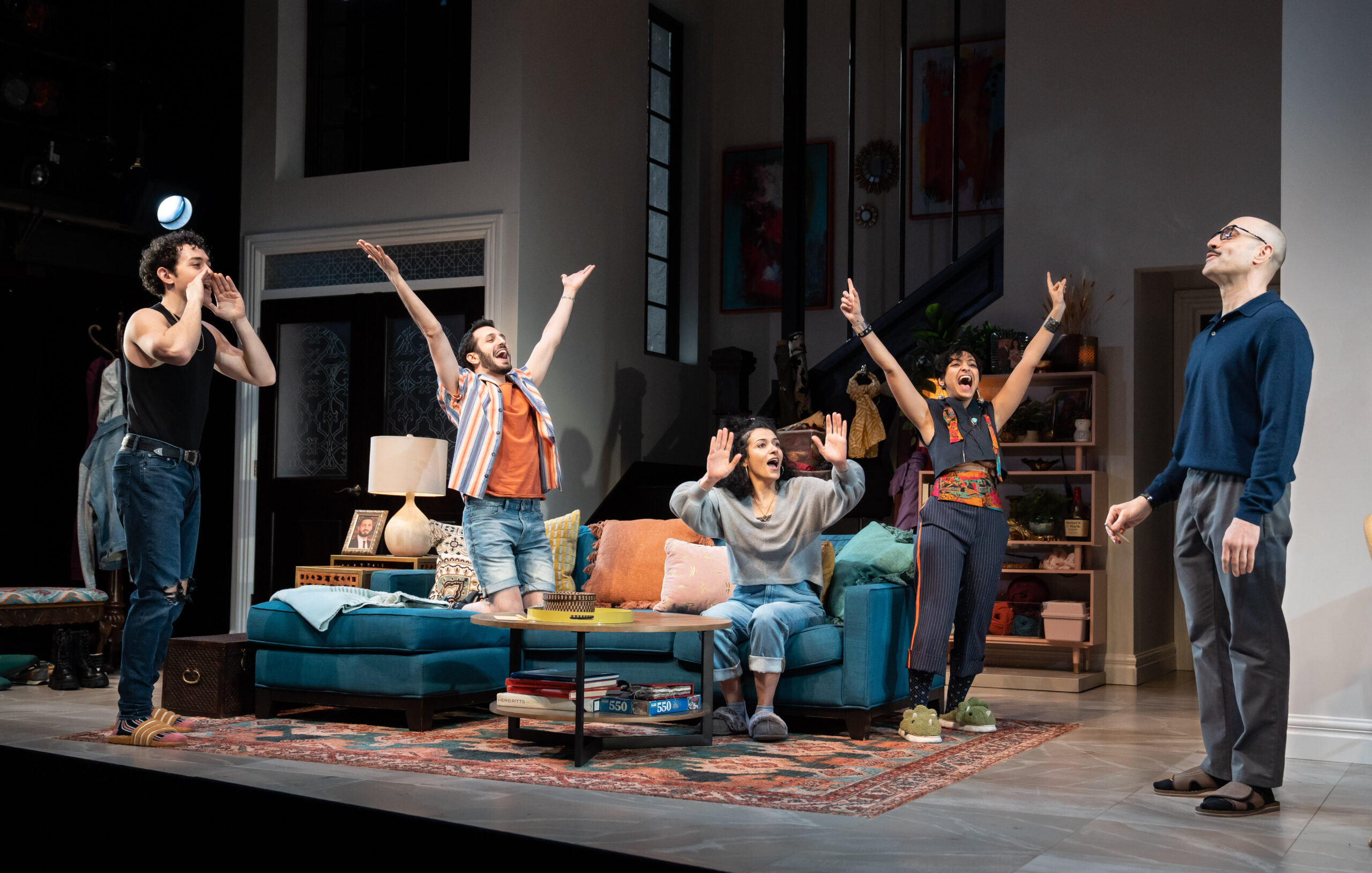Layalina. By Martin Yousif Zebari. Directed by Sivan Battat. Goodman Theatre, Chicago.
March 17, 2023.
Reviewed by Sami Ismat
Columbia College Chicago
You walk into the theatre greeted first by the music of the legendary Iraqi singer and composer Kadim Al Sahir, particularly his songs about love, adapted from the poems of the great Syrian poet Nizar Qabbani. These sounds are complemented by the elegant set, designed by casaboyce, depicting an upper middle class Christian Iraqi home. Christian Arab representation on stage is rare, and in Layalina this representation never ceases to be authentically Iraqi, with all the gold, silverware, shiny metallic objects, and ornate furniture that make up the set. One can tell that this family is blessed—in fact we are made aware of this multiple times throughout the play. But in war and invasion nobody remains blessed, which is something Layalina highlights well in the journey of the Ibrahim family, who are dispersed fleeing their native home in Baghdad.

Ali Louis Bourzgui in Martin Yousif Zebari’s Layalina. Image Credit: Liz Lauren
In the opening scene, the Ibrahims return from the wedding of their daughter Layal. Clearly, this is a close family, comfortable in their lives in Baghdad. The newly wedded Layal (Becca Khalil) and her husband Sahir (Waseem Alzer) are moving to Skokie, Illinois, to live close to Sahir’s parents; he has not seen them in years, due to what seems to be obligatory military service in Iraq. At the same time, the USA, referred to by the characters at times as the “Land of Freedom,” is invading Iraq. Young Mazin (Ali Louis Bourzgui) and Sahir are secretly going to protests demanding freedom for Iraq against the Americans. This angers Mazin’s and Layal’s father Yassir (Mattico David), who appears to have a decent job with the Iraqi government, and who wants to protect everyone in their family. The argument introduced here by the plot makes us wonder if we should protest or rather work for freedom, as Yassir says. For an American audience, protest might seem like an obvious choice to gain your rights, but for many others, protests mean walking to your death, especially within the context of the Iraq invasion in 2003.
We witness all this external pressure piling up in multiple monologue scenes where Yassir is speaking on the phone, to try to arrange whatever it takes to protect his family. The direction of Sivan Battat emphasizes the isolated state Yassir is in during the monologues by placing him under a spotlight at the corners of the stage, trapped by what is happening around him. After he and his wife Karima (Atra Asdou) are denied visas to the US, he goes to the extent of faking their death certificates, in order to get his young children Marwa and Yousif visas to go to America, with Layal and Sahir as their adult guardians. Martin Yousif Zebari reveals in this plot the cold bureaucracy of visa-issuing bodies and immigration systems. This forces people like the Ibrahims to do things like faking death certificates to ensure their children’s survival, and not for self-gain, an accusation often leveled at immigrant families.

(L-R) Waseem Alzer and Becca Khalil in Martin Yousif Zebari’s Layalina. Image Credit: Liz Lauren.
The first act establishes these conflicts and the gender roles in the family. The mother Karima is the wise caretaker, and the father Yassir carries the weight of everything on his shoulders. We witness a family falling apart under the pressure of circumstances that create conflicts between them. Yet we see love still floating and a new kind of love emerging with Young Mazin kissing his sister’s new groom Sahir, foreshadowing a gay Arab love story unfolding on an American stage. This moment suggests that amidst conflict and high-pressure/high stakes situations we become braver in expressing our love because we realize there is an existential threat looming over us. This existential threat quickly turns into reality as Sahir dies in Mazin’s arms after he is shot in a protest. Director Sivan Battat makes the stage vibrate with a theatrical ritual of death, combining physical choreography with smoke, lights, sound, and powerful vocal expressions from the actors grieving the death of their beloved Sahir. This moment took all the time it needed and featured a big shift that was felt by everyone in the theatre from what I could tell. This same ritual is used to indicate that the actors change roles, though that may have been missed because of the energy this moment held.
An intermission followed, where stage crew visibly started taking parts of the ornate Iraqi home in Act 1 and replacing them with colorful modern designs. In Act 2, the actors switch characters. Becca Khalil, who was Young Layal, is now Marwa, Ali Louis Bourzgui, formerly young Mazin, is now Yousif, and Waseem Alzer, who was Sahir, now plays his younger brother Amin. In Act 1 we only hear the voices of Yousif, Marwa and Amin as three young children off stage, but they are referred to many times throughout. The actors playing Yassir and Karima, Mattico David and Atra Asdou, are now Mazin, whose family arranged a marriage for him with an Iraqi woman in Australia, and Layal, who immigrated with her younger siblings to Skokie. If audiences missed the symbolic transfer of roles in the ritual, it might take a few moments to recognize who is playing who, but the production does a great job to quickly establish difference. The ensemble of actors does an excellent job of embodying these new roles differently, and grown-up Layal and Mazin speak with more of an accent, now that they are in the US in Act 2. This helps distinguish them from their younger siblings, and from their previous characters Yasir and Karima, who spoke with no accent in Act 1, which took place in Iraq. None of the characters had an accent in Act 1, because they really did not need to sound different in their native homeland.
The act begins with Mazin coming to reunite with his siblings after many years. We learn that both Yassir and Karima stayed in Iraq until they passed away without seeing their children. Yet the guilt and unprocessed grief behind the death of Sahir still weighs upon everything in the theatre, the audience included. With this choice, the playwright explores in front of us the cultural baggage we inherit, and the grief we carry, with all its complexities, after enduring many losses. We notice that these characters repeat certain lines even after all these years away from Baghdad. These characters serve as representation for all those immigrants who strive to stay true to who they are and have to negotiate their survival in a world different from their home in order to do so. We see Layal as a cool mom, negotiating her own boundaries and accepting her younger siblings Marwa and Yousif with their queerness, smoking weed, and using non-binary pronouns. Layal is persistent and clearly has not abandoned her values, yet she is accepting of change and of shifting boundaries.

(L-R) Ali Louis Bourzgui, Waseem Alzer, Atra Asdou, Becca Khalil and Mattico David in Martin Yousif Zebari’s Layalina. Image Credit: Liz Lauren.
Martin Yousif Zebari never falls into the stereotypical representation of Arab men in American theatre. Mazin, now a fatherly Arab man in Act 2, is presented as confused and cautious: he expresses to Layal his disagreement about how she has raised their younger siblings, yet he never shouts at anyone, gets angry or violent. The only moment where Mazin emotionally explodes is after Marwa returns home bleeding after participating in a Black Lives Matter protest. This moment clearly reignites an emotional response in Mazin, due to how Sahir got killed in a protest in Act 1. We witness Mazin embodying a sentiment similar to Yasir’s about protecting the family, adding that Sahir died protesting for all of them. Yousif, Marwa and Amin are proud of where they come from and speak their mind, just like young Mazin, young Layal, and Sahir; we see them indulge in Iraqi tea, food, and music just like their older siblings, with the only noticeable difference being the place and environment. Again, the choice of making the same actors play these characters emphasized these connections even more. The story shows us what Layal and Mazin inherited from their parents, and how their younger siblings inherited resilience and the freedom to protest from Layal, Mazin, and Sahir.
Seeing this production premier at one of most prominent theatres in the US is a reminder that Arabs can be Christians as well as queer, erotic sexual beings, with desires and flaws. It is no wonder Iraqis love diamonds and shiny metals forged under high pressure, because it resembles their spirit. They are humans with flaws, and Layalina treats us to witness how they endure through grief, loss, and war, and navigate their inner family conflicts. These characters possess the solidity and brightness of diamonds, in their perseverance and love of life that transcends everything, like the stars in the night sky (layalina means “our nights” in Arabic). This is something that those in Iraq would appreciate witnessing about themselves; it would make them proud to see the core of who they are shine on stage.
Sami Ismat is a research practitioner in performance & theatre, and an Adjunct Professor at Columbia College Chicago, DePaul University, & School of the Art Institute of Chicago. He is also an associate artist with Silk Road Rising and has created, performed, and consulted on numerous projects at various cultural institutions. His work explores decolonization, shifting and redefining dominant narratives on ethnicity, identity, and the racialization of bodies by using performance as a vehicle for public dialogue. His research focuses on the intersectionality of performance with presentation, representation of memory, trauma, and collective cultural consciousness, with emphasis on dis-orientalizing the narrative and the gaze. He draws on practices stemming from contemporary performance art, devised & physical theatre, documentary practices, ethnographic research, and choreography. His latest publication is a chapter titled “Deconstructing Myths via Performance Strategies: Experiences of a Contemporary Practitioner” in Deconstructing the Myths of Islamic Art (Routledge 2022).

Arab Stages
Volume 14 (Spring 2023)
©2023 by Martin E. Segal Theatre Center Publications
Founding Editor: Marvin Carlson
Founders: Marvin Carlson and Frank Hentschker
Editor: Edward Ziter
Performance Reviews Editor: Katherine Hennessey
Book Reviews Editor: George Potter
Editorial and Advisory Board: Fawzia Afzal-Khan, Dina Amin, Khalid Amine, Dalia Basiouny, Katherine Donovan, Masud Hamdan, Sameh Hanna, Rolf C. Hemke, Areeg Ibrahim, Jamil Khoury, Dominika Laster, Margaret Litvin, Rebekah Maggor, Safi Mahfouz, Robert Myers, Michael Malek Naijar, Hala Nassar, Juan Recondo, Nada Saab, Asaad Al-Saleh, Torange Yeghiazarian.
Managing Editors: Melissa Flower Gladney and Juhyun Woo
Table of Contents:
Up There by Wael Kadour, Introduction by Edward Ziter
Baba written by Denmo Ibrahim, directed by Hamid Dehghani, reviewed by Suzi Elnaggar
Layalina written by Martin Yousif Zebari, directed by Sivan Battat, reviewed by Sami Ismat
Mother Courage adapted and directed by Alison Shan Price, reviewed by Hassan Hajiyah
Playwright Showcase, New Arab American Theater Works, reviewed by Katherine Hennessey



